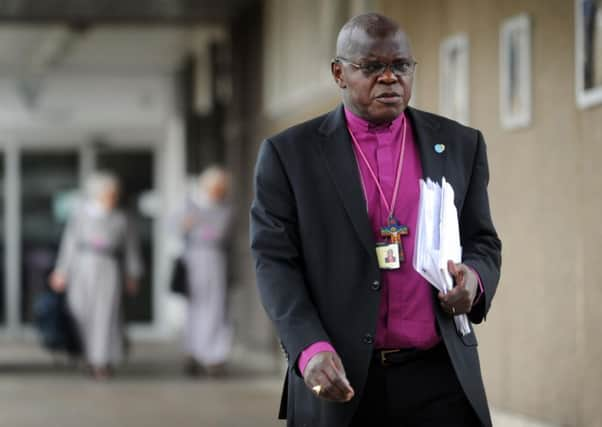Inquiry call on Assisted Dying Bill


John Sentamu insisted the Parliamentary process could not be rushed because it was “far too complex and sensitive” to be determined on the basis of “competing personal stories”.
Speaking in the second reading debate, the Archbishop said the Bill was not about the relieving of pain and suffering, but the assertion of a philosophy which “thoughtful people of goodwill... must find incredible”.
Advertisement
Hide AdAdvertisement
Hide AdHe told peers: “(It asserts) the ancient Stoic philosophy that ending one’s life in circumstances of distress is an assertion of human freedom. That it cannot be.
“Human freedom is won only by becoming reconciled with the need to die, and by affirming the human relations we have with other people. Accepting the approach of death is not the attitude of passivity that we may think it to be.
“Dying well is the positive achievement of a task that belongs with our humanity. It is unlike all other tasks given to us in life, but it expresses the value we set on life as no other approach to death can do.”
He reflected on how his mother Ruth, when diagnosed with an aggressive throat cancer, was given weeks to live, only to survive for 18 months with hospice care.
Advertisement
Hide AdAdvertisement
Hide AdThe Archbishop said: “During this time our children, who had been born in England, were able to get to know and love their grandmother, and she was able to delight in them.
“This was a gift.”
The remarks were made during a marathon debate in the House, where the Former Lord Chancellor Lord Falconer of Thoroton said that giving people with terminal illness the right to die would not lead to more deaths, but would mean fewer suffering “lonely, cruel” ends. He called for a “limited and safeguarded” change in the law to allow doctors to prescribe a lethal dose to terminally ill patients judged to have less than six months to live.
Presenting his Assisted Dying Bill in the House of Lords yesterday, he said while it was important to continue to improve end of life care, for a minority this was not good enough.
He told peers: “The current situation leaves the rich able to go to Switzerland, the majority reliant on amateur assistance, the compassionate treated like criminals.”
Advertisement
Hide AdAdvertisement
Hide AdA ComRes poll for ITV this week found that 70 per cent of Britons would support allowing assisted dying under the measures being proposed, with 10 per cent disagreeing.
But some 47 per cent said they believed legalising assisted suicide would “inevitably” lead to some vulnerable people opting to end their lives to avoid becoming a burden on their loved ones.
Paralympic gold medallist Baroness Grey-Thompson has insisted that supporters of a peer’s assisted dying proposals need to know it will not provide a “Hollywood death”.
The independent Crossbench peer said people need to be told if the changes would result in Dignitas-style facilities around the country or allow them to die at home while surrounded by family.
Advertisement
Hide AdAdvertisement
Hide AdShe also voiced concerns that Lord Falconer’s Assisted Dying Bill lacked protections, with disabled people worried that confusion in the law could lead to it being extended beyond those with a terminal illness.
Lord Tebbit has warned the Assisted Dying Bill creates a financial incentive for “vultures” to swarm over the dying.